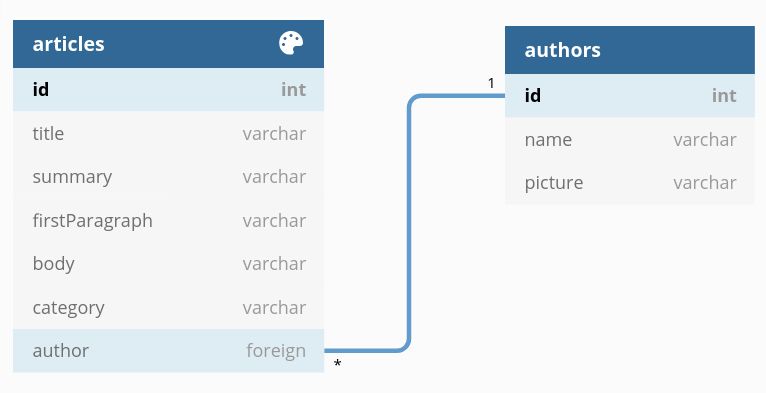This is a simple backend application of a Django API with Token authentication, which allows for user sign-up and logins. It utilizes PostgresSQL to implement the following model:
Anonymous users may consume the API for most article and author data, but they cannot read the body field of articles.
/api/articles/
/api/articles/?category=:slug
Anonymous users may sign up via POST in order to login and retrieve an authentication token. Users logged in with an authentication token may create, read, update, and delete articles as well as authors.
/api/sign-up/
/api/login/
/api/admin/articles/
/api/admin/authors/
For more details on the endpoints, the API is documented with drf-yasg and possesses a Redocs endpoint.
/api/redoc/
If you use Insomnia for REST API development, check out /docs/ for importing and performing test requests.
To set up the application for development, follow these steps:
1 - Clone the repository locally.
git clone https://github.com/lucasgcb/django-JD-challenge.git2 - Install Docker and Docker-Compose, if you don't have them.
3 - Enter the local repository
$ cd django-JD-challenge4 - Set the environment variables on docker-compose.yml.
- Setting
DEBUG=1will turn Django's debug mode, andPYSVR=1will allow formanage.py's runserver option on http://localhost:8000 - If
PYSVR=0, Docker will launch Django behind gunicorn and whitenoise on http://localhost:8000
5 - Run docker compose.
$ sudo docker-compose upThe development server should be running on http://localhost:8000
To make sure the Docker application is production ready, go through the checklist:
- Double check the environment variables in /env/.
- ./env/db.env contains the db information for default database name, user, and password. Adjust these for your deployment needs.
- ./env/django.env contains sensitive Django information including secret key and Allowed hosts. Adjust these for your deployment needs.
- In docker-compose.yml, set
PYSVR=0so Docker will launch Django behind gunicorn and whitenoise andDEBUG=0to disable Django's debug mode.
After making sure the environment variables are set, simply boot docker-compose and the production build will be running on http://localhost:8000
$ sudo docker-compose upChallenge goal: The purpose of this challenge is to give an overall understanding of a backend application. You’ll be implementing a simplified version of a news provider API. The concepts that you’re going to apply are:
- REST architecture;
- Authentication and permissions;
- Data modeling and migrations;
- PostgreSQL database;
- Query optimization;
- Serialization;
- Production builds (using Docker).
Target level: This is an all around challenge that cover both juniors and experience devs based on the depth of how the concepts were applied.
Final accomplishment: By the end of this challenge you’ll have a production ready API.
- Clear instructions on how to run the application in development mode
- Clear instructions on how to run the application in a Docker container for production
- A good API documentation or collection
- Login API:
/api/login/ - Sign-up API:
/api/sign-up/ - Administrator restricted APIs:
- CRUD
/api/admin/authors/ - CRUD
/api/admin/articles/
- CRUD
- List article endpoint
/api/articles/?category=:slugwith the following response:
[
{
"id": "39df53da-542a-3518-9c19-3568e21644fe",
"author": {
"id": "2d460e48-a4fa-370b-a2d0-79f2f601988c",
"name": "Author Name",
"picture": "https://picture.url"
},
"category": "Category",
"title": "Article title",
"summary": "This is a summary of the article"
},
...
]-
Article detail endpoint
/api/articles/:id/with different responses for anonymous and logged users:Anonymous
{ "id": "39df53da-542a-3518-9c19-3568e21644fe", "author": { "id": "2d460e48-a4fa-370b-a2d0-79f2f601988c", "name": "Author Name", "picture": "https://picture.url" }, "category": "Category", "title": "Article title", "summary": "This is a summary of the article", "firstParagraph": "<p>This is the first paragraph of this article</p>" }Logged user
{ "id": "39df53da-542a-3518-9c19-3568e21644fe", "author": { "id": "2d460e48-a4fa-370b-a2d0-79f2f601988c", "name": "Author Name", "picture": "https://picture.url" }, "category": "Category", "title": "Article title", "summary": "This is a summary of the article", "firstParagraph": "<p>This is the first paragraph of this article</p>", "body": "<div><p>Second paragraph</p><p>Third paragraph</p></div>" }
